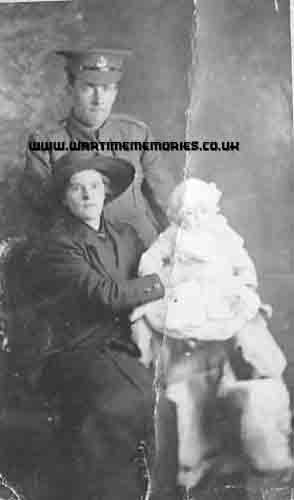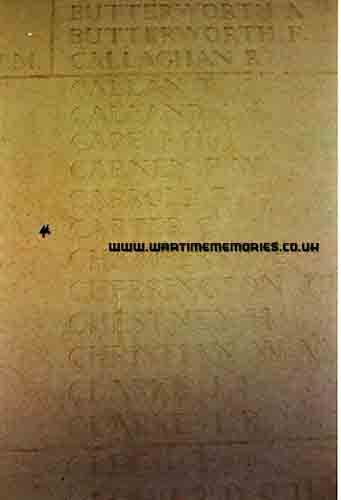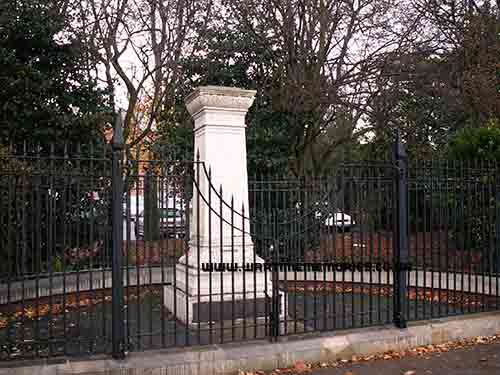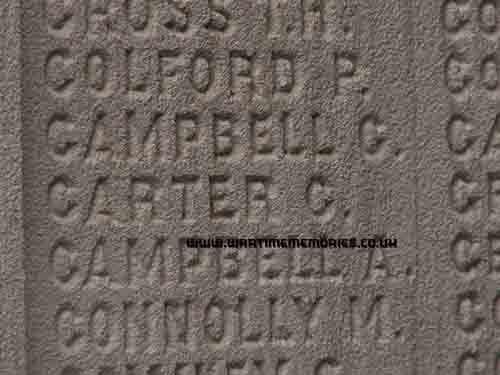Additions will be checked before being published on the website and where possible will be forwarded to the person who submitted the original entries. Your contact details will not be forwarded, but they can send a reply via this messaging system.
please scroll down to send a message
Pte. Christopher Carter
British Army 13th Btn. Kings (Liverpool) Regiment
from:Litherland, Liverpool
(d.28th Mar 1918)
Christopher Carter's date of enlistment into the Kings Regiment is not known but he married Margaret Isabel Davies on 17th of June 1916, he was at that time already a soldier stationed at Park Hall Camp, Oswestry. He was killed in action on the 28th of March 1918 serving with the 13th Battalion, King's Liverpool Regiment. He has no known grave and is commemorated by name on the Litherland War Memorial and also at the Arras Memorial. He is also listed on the Roll of Honour for Kings (Liverpool) Regiment located in the Museum of Liverpool City Soldiers Gallery.
Below is the transcript of the Battalion War Diary of the day, 28th of March 1918
"After a bombardment of great violence," state the official despatches, "three fresh German divisions advanced to the assault along the northern bank of the Scarpe River: they were supported by the two German divisions already in the line. The enemy's immediate objective was to gain the general line Vimy-Bailleul-St. Laurent-Blangy. On the following day three special assault divisions were to carry the Vimy Ridge. Immediately south of the Scarpe four German divisions were engaged, to two of which were assigned the tasks of capturing Arras and the heights overlooking the town. This assault, the weight of which fell on the 3rd and 15th British Divisions, was supported by powerful attacks in which eleven hostile divisions were engaged along our whole front southwards to beyond Bucquoy. In this great assault the methods adopted by the enemy on the 21st of March were employed once more. But the fog which had then blinded our artillery and machine gunners was now absent and, as a consequence, the advancing lines of the Germans were met everywhere along the whole front by a merciless fire which decimated their ranks and shattered their attack. Though in one place (north of the Scrape) the enemies infantry advanced in solid masses almost shoulder-to-shoulder and six lines deep, all that he accomplished was the capture in a few places of our outpost line; in no place did he enter our front line.
A second attack, north of the Scarpe, launched during the afternoon after another heavy bombardment, was also completely repulsed and, broken and disappointed, the enemy fell back to his original line. The 1st King's were still in support in Englebelmer on the 28th. They were so weak in strength that they were temporarily joined to the 2nd South Stafford's under Major W.C.Smith, Colonel Murray-Lyon going to the transport lines for a rest. The 29th saw the battalion moving up to the front line in Aveluy Wood, which they took over after dark. Thus the enemies great attack on the 28th March did not involve the 1st King's in active operations . The 13th King's however, were heavily engaged by the enemy's great attack on the 28th of March.
The 9th Brigade Narrative of Operations prefaces its description of the battle with the following words "The story of the battle which followed is one of desperate fighting, a soldier's battle in which the order of 'no retirement' was literally carried out until 5pm, both flanks being in the air and a serious attack on the Green Line that day being awaited, orders were issued for the remaining troops of the brigade to withdraw behind the Green Line."
The battalion story relates that at 4:30 am the enemy put down an intense barrage on the whole of our sector. The trench mortar barrage on the front line was more intense than anything previously experienced. The Reserve Line was barraged with field guns and heavies. Under cover of this barrage the enemy launched a terrific attack with masses of troops. In spite of the intensity of the bombardment the front line stood firm and poured a devastating fire into the enemy whose attack was beaten off with colossal casualties to the attackers. The value of this steadfastness against tremendous odds cannot be estimated; it gave the enemy his first check at a point where he was to be subsequently checked throughout the day. The enemy came back again in a second attack with even greater numbers. The Battalion on our right were pressed back and the enemy poured in behind "C and "D" Companies from the right flank. What happened on the left flank is not known. All that is known is that these two companies, attacked on all sides, mounted the parapet and fought to the finish on the ground on which they stood. Under cover of the barrage the enemy came on up the hill to the reserve lines. Owing to the nature of the ground, he could not be observed along most of the battalion front until nearly on our wire. The barrage lifted and in dense waves the Germans swept onto our lines, it was the beginning of a fierce battle which lasted until 2pm. The coolness, courage and endurance of the garrison were beyond praise. Every rifle and Lewis Gun brought a tremendous volume of fire to bear on the approaching masses. In spite of his losses the enemy continued to push on until the thin line, wavering could go no further and turned down the slope again. Our men mounted the parapet to keep him under fire as long as they could keep him in sight. The first attack on the first line had been beaten off and our line was everywhere intact.
The 13th King's were in touch on the right with the with the 7th Shropshires, and on the left with the 1st Northumberland Fusiliers. The enemy now resumed his barrage on our position by firing green lights. An intense barrage came down for 10 or 15 minutes. As soon as it lifted the enemy immediately came on to another attack, this also was repulsed with heavy loss to the enemy. Our flank and our left flank was becoming exposed. Twice again the enemy fell back, each time bringing down the barrage on our position with green lights and pushing on his attack as soon as it lifted. About midday the enemy's fourth attack penetrated on our right. A block was immediately made and maintained about 150 yards from the Road on the southern side approximately N.25.d.7.4. A defensive flank was put out and a few men lined the banks of the of of Neuville Vitasse Road to guard our rear as far as was possible. During the morning one company of the 4th Btn Royal Fusiliers had come up to reinforce and was distributed with two platoons on the SW side of the Menin Road, and two platoons, and two platoons near the St. Martin-sur-cojeul Road in N.25.a.
From midday onwards only about five or six hundred yards of the reserve line remained in our hands, the troops on both flanks having fallen back some hundreds of yards. It was evident that when the next hostile attack came the position would inevitably be surrounded and would hold out no longer. However it was decided to hold on, though the Brigade message informed us that no reinforcements were available. At 2pm a message from Brigade instructed us to rendezvous in N.24. central (about seven hundred yards east of Wancourt) if withdrawal became necessary. Withdrawal to support of the 4th Royal Fusiliers in the Green Line was then decided upon and orders were issued for an immediate withdrawal. It commenced at 3.30 pm, the movement from the front line being covered by small posts and blocks and the defensive flank on the right remaining in position until all the garrison of the reserve Line had moved off to the SW of Neuville Vitasse Road By The Sugar Factory. The enemy moving forward for another attack severely harassed the withdrawal, and it was only by great gallantry and initiative by individuals that the enemy was warded off until the line was clear. By 5pm all troops had passed through the Green Line with all wounded evacuated and without anyone being cut off. The Battalion re-organised under cover of the ridge in N.24.Central and at dusk moved back into Brigade Reserve and occupied trenches in M.22.C (about 1,200yards north West of Mercatel).
On the 29th the 13th King's remained in brigade reserve, the situation then being quiet. At 11pm the battalion was relieved by Canadian troops and marched back to Monchiet. Thus, south of Scarpe, the enemy had made a very small advance, but it was valueless for his purpose and not at all worth the huge casualties he had suffered. So far as the enemy was concerned the First Battle of Arras, 1918, was a complete failure, disastrous to him in every way.



